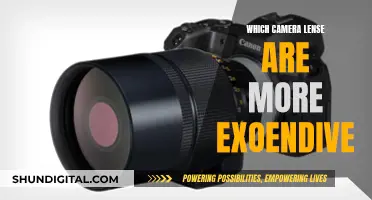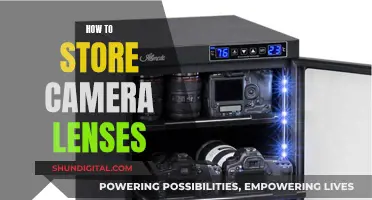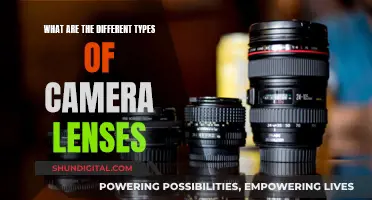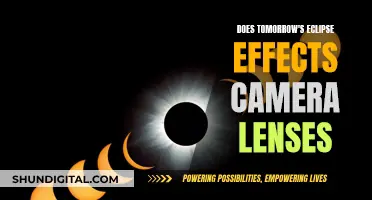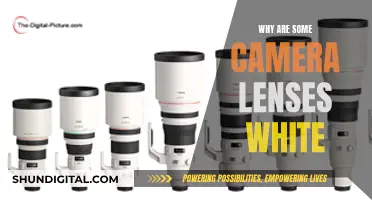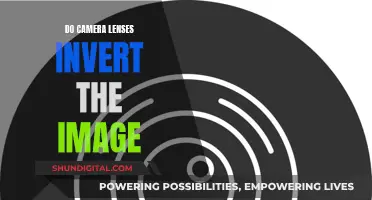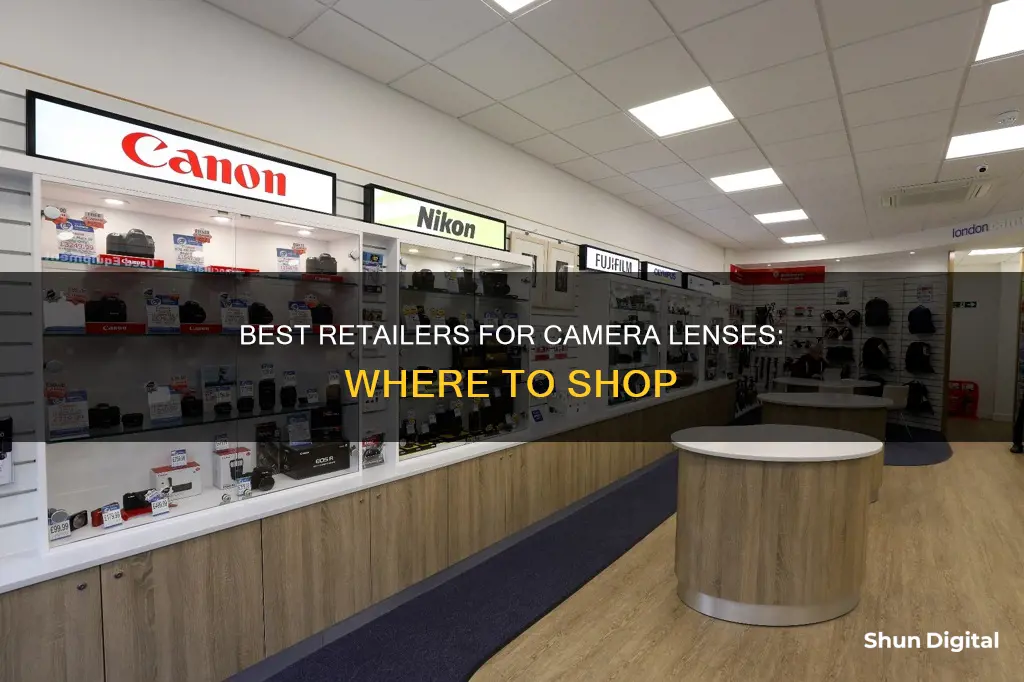
Camera lenses are an essential tool for photographers, and the right lens can make all the difference in capturing the perfect shot. When it comes to purchasing camera lenses, there are several retailers to consider, both online and physical stores. Adorama, for instance, offers a wide selection of lenses for various camera formats, including full-frame DSLRs, mirrorless cameras, and medium format cameras. They carry brands such as Canon, Nikon, and Sony. Best Buy is another option, providing lenses for DSLR and mirrorless cameras, with brands like Sony, Canon, and Fujifilm. CameraMall is a smaller store that sells open-box cameras and lenses at discounted prices, all while upholding strict condition guidelines. KEH Camera is a great choice if you're looking to buy or sell used camera equipment, and they've been in the business since 1979. Lastly, Target offers a selection of camera lenses from top brands, including Canon and Vivitar.
| Characteristics | Values |
|---|---|
| Number of Stores | 5 |
| Store Names | Best Buy, KEH Camera, Target, CameraMall, Adorama |
| Product Condition | New, Used, Open-Box |
| Product Types | Lenses, Lens Accessories, Lens Filters |
| Additional Services | Trade-In, Repair, Photo Lab Services |
What You'll Learn

Camera lens types
Camera lenses are an essential component of photography, as they focus light from the viewfinder into a tiny spot on the camera's film, DSLR, or mirrorless image sensor. The lens used can significantly impact the final image, and there are many different types of lenses available, each with its own advantages and disadvantages.
The two main categories of camera lenses are prime and zoom lenses. Prime lenses have a fixed focal length, meaning the photographer cannot zoom in or out but must instead physically move closer to or further from the subject. Zoom lenses, on the other hand, offer a variable focal length, allowing the photographer to change their composition by zooming in or out.
Within these two broad categories, there are several specific types of lenses. Wide-angle lenses, for example, offer a wider field of view, allowing more of the scene to be captured. They are often used in landscape and architectural photography to capture wide-open spaces or confined interior spaces. They also provide greater depth of field, allowing for sharper images.
Telephoto lenses are another type of lens, ideal for situations where the photographer cannot get close enough to the subject, such as in wildlife or sports photography. They have a long focal length, typically starting at 70mm, and can be used to create a shallow depth of field, with the background appearing out of focus.
A third type is the macro lens, used for close-up photography of small subjects like flowers or insects. These lenses allow for a very short focusing distance and can produce life-size images of the subject.
Other specialised lenses include fisheye lenses, which create an ultra-wide-angle view with curved lines, and tilt-shift lenses, which allow the photographer to change the perspective and alter the depth of field by tilting or shifting the lens in relation to the sensor.
The choice of lens depends on the photographer's goals and budget, as well as the specific style of photography they wish to pursue.
Understanding the 28-400 Lenses: Full-Frame Compatibility Explored
You may want to see also

Where to buy camera lenses
There are many stores where you can buy camera lenses, both in-store and online. Some of the larger, more well-known stores include Best Buy, Target, and Adorama. These stores offer a wide range of camera lenses from various brands, including Canon, Nikon, Sony, and Sigma. They also offer different types of lenses, such as prime lenses, zoom lenses, wide-angle lenses, and telephoto lenses, catering to different photography styles and needs.
In addition to new lenses, some stores like CameraMall and KEH Camera also offer used, open-box, or pre-owned camera lenses at discounted prices. This can be a great option for those looking for a deal or wanting to explore vintage options. These stores often have expert staff who can guide you through the buying process and ensure you get the right lens for your needs.
When purchasing a camera lens, it is important to consider the type of camera you have, as not all lenses are universal. Different camera brands and models may require specific lens mounts and fittings. Additionally, it is worth considering the type of photography you intend to do, as this will influence the type of lens you need. For example, a wide-angle lens is great for landscapes and architecture, while a telephoto lens is better suited for nature photography.
Lastly, don't forget to inquire about lens care and maintenance, as well as any available warranties or return policies, to ensure your investment is well-protected.
Refurbishing Camera Lenses: A Step-by-Step Guide to Restoring Optics
You may want to see also

Camera lens reviews
When it comes to camera lens reviews, there are several websites that provide detailed assessments and customer ratings. These reviews can be incredibly helpful in making an informed decision about purchasing a new camera lens. Here are some key insights and reviews to consider:
DXOMARK:
DXOMARK offers an extensive database that allows users to browse and compare camera lenses based on various criteria such as brand, launch price, and launch date. Each review includes scores, specifications, and key measurements, providing a comprehensive overview of the lens's performance. The site also enables users to pair the lens with different camera sensors for more detailed results.
Ken Rockwell's Reviews:
Ken Rockwell provides a wide range of camera and lens reviews, covering various brands and types, including mirrorless, DSLR, 35mm, and rangefinder lenses. The site offers insights into specific lenses, such as Sony E Lenses and Canon Mirrorless Camera lenses, helping photographers make informed choices.
The-Digital-Picture:
The-Digital-Picture is an independent review site that covers a broad range of camera and lens reviews, including Canon, Sony, Rokinon, Sigma, and Tamron lenses. The site provides clear and precise assessments, manufacturer-independent, helping millions of photographers find the right gear. The reviews offer a comprehensive understanding of each product, including its features and performance, enabling users to make informed decisions.
Best Buy:
Best Buy offers a wide selection of camera lenses from various brands, along with customer reviews and ratings. For example, the Sony FE 70-200mm F2.8 GM OSS II Full-Frame Telephoto Zoom G Master E-mount Lens has a rating of 4.9 out of 5 stars with 150 reviews. Best Buy also provides lens recommendations and accessories, such as camera bags and lens filters, to enhance the photography experience.
Target:
Target also offers a range of camera lenses from top brands, including Canon and Vivitar. For instance, the Canon EF75-300mm f4-5.6 III telephoto zoom lens for EOS DSLR cameras is a popular option available at Target.
By consulting these reviews and ratings from trusted sources, photographers can make well-informed decisions when purchasing new camera lenses, ensuring they get the best possible gear for their specific needs.
Megapixels: Camera Lens Quality or Marketing Ploy?
You may want to see also

Camera lens prices
Standard Zoom or Wide-Angle Lenses
Standard zoom or wide-angle lenses typically cost between $100 and $2,000 or more. For example, the Sigma 24-70mm F2.8 EX DG lens, which is designed for DSLRs and 35mm SLRs, costs around $570.
Telephoto Lenses
Telephoto lenses generally cost between $150 and $5,000 or more. The Canon EF 100-400mm f/4.5-5.6L IS USM, equipped with two image stabilizer modes, is available for approximately $1,500.
Prime Lenses
Prime lenses, which offer a fixed focal length and high-quality optics, usually range from $100 to $5,000 or more. The AF-S Nikkor 50mm f/1.4G, ideal for general-purpose photography, costs about $450.
Specialty Lenses
Specialty lenses, such as macro lenses for extreme close-ups and fish-eye lenses that provide a distorted bubble effect, can range from $60 to $2,000 or more.
Beginner Lenses
Lenses suitable for beginners typically cost between $100 and $400. For example, the Canon EF-S 18-55mm f/3.5-5.6 IS II, known as the standard "kit" lens, is perfect for those starting out in photography.
Intermediate and Advanced Enthusiast Lenses
More advanced lenses for enthusiasts and advanced hobbyists range from $200 to $700. The Canon EF-S 18-135mm f/3.5-5.6 IS USM Lens is a popular choice in this price range.
Professional Lenses
Professional-grade lenses can cost anywhere from $500 to $11,000 or more. The Canon EF 800mm f/5.6L IS USM Lens, for example, is an investment piece for those looking to capture the best long-distance photos.
Factors Affecting Price
The quality of the lens, the manufacturer, and the type of lens all influence the price. Name-brand lenses tend to be more expensive, offering the best sharpness and lowest image distortion. Additionally, zoom lenses are generally pricier than prime lenses due to their flexibility.
Ways to Save Money
There are a few strategies to consider when looking to save money on camera lenses:
- "Crop" lenses, designed for smaller sensors, tend to be cheaper as they are smaller in size and have smaller individual lens elements.
- White box or bulk-packaged lenses are new but packaged in bulk, allowing for cheaper shipping to lens dealers.
- Pre-owned lenses can offer significant savings, and many retailers, such as KEH, specialise in used equipment.
Infinity Focus: Are Camera Lenses Capable?
You may want to see also

Camera lens accessories
Lens caps are essential for protecting the front and rear of your lenses. They keep out dirt and prevent accidental damage to the glass. It is important to replace lost or damaged lens caps to avoid scratching your lenses. A lens cap leash is also useful as it keeps the cap secure while shooting and prevents loss if the cap accidentally falls off.
Another way to protect your lenses is by using a lens filter. Skylight or UV filters can be permanently fitted to your lens, providing continuous protection. Alternatively, a lens hood can be attached to prevent optical distortion and protect your lens from accidental impact. Lens hoods typically screw onto the front of the lens, like the 52mm lens hood designed for 52mm lenses.
Lens cases provide safe storage for your camera lenses, especially when travelling. A camera case can also offer protection for your lenses, in addition to your camera body and other accessories. For added protection, consider using a cushioned lens skin or a lens bumper.
Adapters, converters, and other lens accessories can enhance the capabilities of your lenses. If you have multiple camera types or incompatible lenses, a lens mount adapter allows you to attach lenses from one camera brand to another. While some functions, such as autofocus and aperture control, may not work with adapters, they still provide versatility. Teleconverters are another useful accessory, extending the capabilities of your telephoto lenses by offering various magnifications. Common magnifications include 1.4x and 2x, although these may result in a slight loss of sharpness and reduced effective lens aperture.
Other popular lens accessories include wide-angle and telephoto add-on lenses, T-mount adapters for screw-mounted lenses, and lens cleaning materials. For those interested in macro photography, extension tubes or bellows can be used to increase the effective magnification by moving the lens away from the camera. Close-up lenses and reversing rings are also useful tools to achieve similar magnifications without the need for a dedicated macro lens.
Unlocking the Secrets of Commercial Camera Lenses' Diffraction Limits
You may want to see also
Frequently asked questions
There are many online stores that sell camera lenses, including Adorama, CameraMall, Best Buy, and Target.
Yes, Adorama and CameraMall offer used camera lenses for sale.
Yes, CameraMall buys used camera lenses. KEH is another store that buys and sells used camera equipment.
Adorama sells camera lenses from brands including Canon, Nikon, Rokinon, Tamron, Sigma, and Sony. CameraMall sells lenses from brands including Canon, Nikon, Sigma, Leica, and Tamron. Best Buy sells lenses from brands including Sony, Fujifilm, Canon, and NIKKOR. Target sells lenses from Canon and Vivitar.


